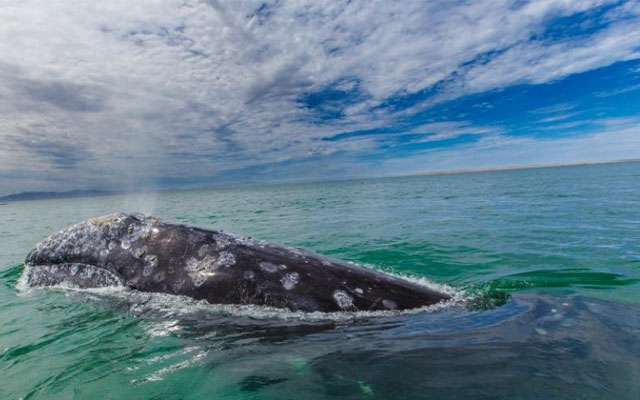
IUCN-led panel warns critically endangered whales in Russia still under threat
The joint report by IUCN-International Union for Conservation for Nature, WWF and International Fund for Animal Welfare (IFAW) examined the results of the work of an IUCN-led independent panel of scientists, which has been advising Sakhalin Energy – one of the largest companies operating in the area – as part of an innovative loan deal.
Over the last 12 years, Sakhalin Energy has made important efforts to limit the impact of its operations on whales and the fragile environment. During this period, the western gray whale population has grown 3-4% annually, from an estimated 115 animals in 2004 to 174 in 2015, the report said
The western gray whale population is currently listed at Critically Endangered on the IUCN Red list of Threatened Species.
“What started 12 years ago as a response to a growing conflict between environmentalists and the oil and gas industry over one critically endangered whale population has resulted in multiple benefits for conservation and business,” said IUCN Director General Inger Andersen.
However, the report also warned that further cooperation and involvement of all companies and industries in the region – including oil and gas operators and fisheries - are crucial to ensure best practices and the long-term protection of the animals.
“The annual increase of Sakhalin whales is encouraging but their recovery in the long-term will depend on more companies in the region joining this effort,” said Doug Nowacek, a well-known specialist in whale behaviour and a Western Gray Whale Advisory Panel (WGWAP) panellist.
He also said, “Sakhalin Energy has demonstrated that it is possible for companies to mitigate their impacts and still operate effectively. But other companies in Sakhalin need to take similar measures to address the problem of cumulative impacts of industry on the marine environment.”
The report, based on interviews with more than 20 experts and stakeholders engaged in the process, explored how the panel generated benefits for business and conservation.
Over the past 12 years, the panel issued more than 539 recommendations to Sakhalin Energy and other parties, 90% of which have been implemented or superseded by subsequent advice. The process has included financial lenders and government officials as well as NGOs, serving as observers.
Among the achievements is a decision by Sakhalin Energy to alter the route of its pipeline to minimize the disruption and impact on the whales’ feeding grounds.
The panel has advocated innovative scientific research, including a satellite-tagging programme that has documented the longest one-way migration of any mammal – a 10,880km journey from Sakhalin to its wintering calving grounds in Mexico’s Baja California peninsula.
In addition, the panel’s work has also led to the development of one of the most comprehensive company Monitoring and Mitigation Plans for seismic surveys, which now serves as the industry’s global guide.
IUCN first established what is now known as WGWAP in 2004 in response to a growing concern over Sakhalin Energy’s plans for expansion in the Sea of Okhotsk and the impact this could have on the critically endangered whales found off Sakhalin Island.
An outcry from NGOs opposing those plans eventually persuaded lenders to tie a number of mitigating conditions to the loan agreement, including a requirement for Sakhalin Energy to finance an independent panel managed by IUCN to provide recommendations on their operations.
“The Western Gray Whale Advisory Panel has reduced the impact of this oil and gas operation on one of the world’s most threatened whales, a legacy the lenders to this project can be proud of,” says Wendy Elliott, Deputy Global Wildlife Leader, WWF International.
He also said, “We encourage other financial institutions to replicate this success by including similarly stringent conditions when granting loans to projects with potentially damaging impacts on threatened wildlife and their habitats.”
“The WGWAP process has served as a constructive platform for open dialogue between the oil and gas companies and NGOs. All of the WGWAP recommendations are public, which has fostered greater transparency and accountability among all of the stakeholders,” said Masha Vorontsova, Director, IFAW Russia & CIS.
During the report’s launch, IUCN confirmed it intends to sign another five-year agreement with Sakhalin Energy to continue this work. Under the new agreement covering 2017-2021, WGWAP will continue to provide independent scientific advice to the company.
Image: IUCN World Conservation Congress
Support Our Journalism
We cannot do without you.. your contribution supports unbiased journalism
IBNS is not driven by any ism- not wokeism, not racism, not skewed secularism, not hyper right-wing or left liberal ideals, nor by any hardline religious beliefs or hyper nationalism. We want to serve you good old objective news, as they are. We do not judge or preach. We let people decide for themselves. We only try to present factual and well-sourced news.







